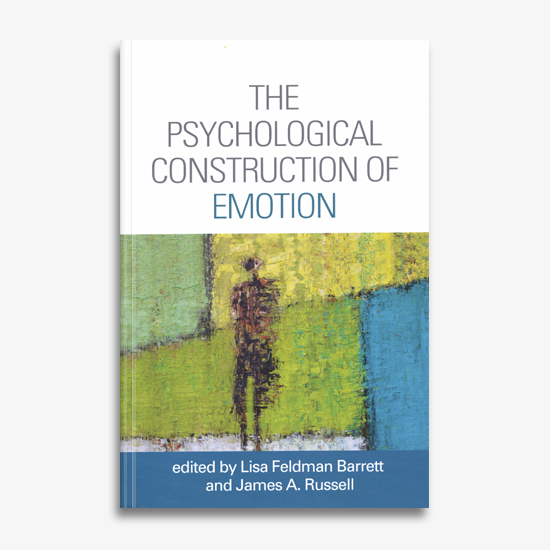
The Psychological Construction of Emotion
Edited by Lisa Feldman Barrett and James A. Russell
This academic volume presents cutting-edge theory and research on emotions as constructed events rather than fixed, essential entities. It provides a thorough introduction to the assumptions, hypotheses, and scientific methods that embody psychological constructionist approaches. Leading scholars examine the neurobiological, cognitive/perceptual, and social processes that give rise to the experiences Western cultures call sadness, anger, fear, and so on. The book explores such compelling questions as how the brain creates emotional experiences, whether the “ingredients” of emotions also give rise to other mental states, and how to define what is or is not an emotion. Introductory and concluding chapters by the editors identify key themes and controversies and compare psychological construction to other theories of emotion.
Praise for The Psychological Construction of Emotion:
“Barrett and Russell have assembled a star-studded cast of scholars. In contrast to faculty psychology accounts, which enumerate distinct psychological modules, psychological construction accounts are concerned with specifying how emotions are constituted from more basic mental processes. This volume’s well-coordinated chapters treat the reader to a fresh set of perspectives. Eschewing the search for ‘essences,’ the authors outline ambitious and exciting programs of process-oriented research. A ‘must read’ for anyone interested in emotion.”
—James J. Gross, PhD, Department of Psychology, Stanford University“Research on emotion has long been dominated by the search for innate modules that unleash feelings. The Psychological Construction of Emotion presents an exciting and compelling alternative.”
—Joseph E. LeDoux, PhD, Center for Neural Science and Department of Psychology, New York University“The science of psychology strikes back (against modularity of mind and biological reductionism). Read The Psychological Construction of Emotion and be dazzled: it reveals the neuroscience of emotion as deep phrenology; basic emotion theory as not basic enough (and certainly not hard-wired); faculty psychology as folk psychology. Read the book and be impressed by the philosophical puzzles of the mind-body problem and the problem of the one and the many when it comes to defining and understanding that mysterious thing called ‘the emotions.’”
—Richard A. Shweder, PhD, Harold Higgins Swift Distinguished Service Professor, Department of Comparative Human Development, University of Chicago“This much-needed book nicely summarizes a new wave of neuroscientific and psychological constructionist accounts of emotion that oppose still very popular and easier-to-grasp essentialist views. Instead of conceiving emotions as hard-wired natural entities that rely on specific modules or networks in the brain selected by biological evolution, constructionist approaches take a more modern dynamical system approach. At a time when simplified one-to-one mappings between high-level psychological phenomena and their underlying biological bases still dominate public discussion, this rich and inspiring book is necessary, refreshing reading.”
—Tania Singer, PhD, Department of Social Neuroscience, Max Planck Institute for Human Cognitive and Brain Sciences, Leipzig, Germany“The publication of this volume is sure to be regarded as a watershed event in the (post)modern study of emotions. Essential. Upper-division undergraduates through faculty and professionals.”
—Choice Reviews 2015-12-01